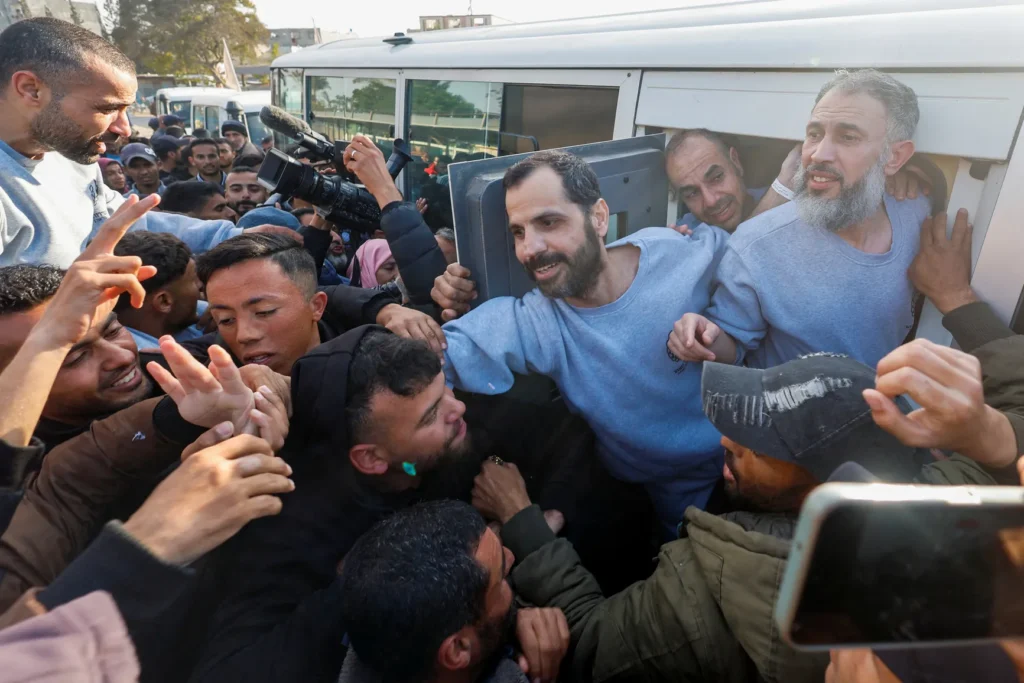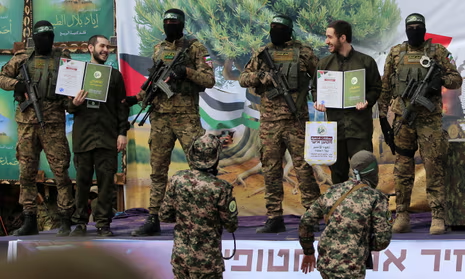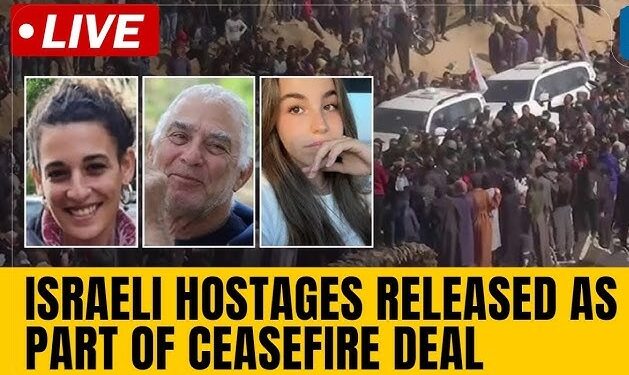Israel has delayed the anticipated release of hundreds of Palestinian prisoners and detainees after the recovery of six Israeli hostages from Gaza. The Palestinian Prisoners Society reported the postponement, while Israel’s Prime Minister’s Office stated the delay was due to Hamas’s handling of the hostage releases, demanding future transfers happen without public ceremonies.
On Saturday, Hamas freed six Israeli hostages through a mix of public and private handovers, concluding the first phase of a ceasefire deal. In exchange, Israel had planned to release 620 Palestinian prisoners, including 23 children and one woman. However, Israeli officials cited security concerns and further reviews as reasons for halting the release.
Hamas accused Israel of violating the ceasefire agreement, raising concerns about the fragile truce. Israeli authorities claimed the delay was a response to Hamas’s repeated breaches of the deal, including using hostages in propaganda videos. One video showed two remaining Israeli captives pleading for their freedom, likely under duress.
Among those released, Tal Shoham and Avera Mengistu were handed over to the Red Cross in Rafah. Mengistu, who has mental health challenges, had crossed into Gaza in 2014. Later, Eliya Cohen, Omer Shem Tov, and Omer Wenkert were released in a public event attended by crowds and armed fighters. The sixth hostage, Hisham al-Sayed, another individual with mental health issues, was handed over quietly in Gaza City.
The hostages were brought back to Israel for medical checks before reuniting with their families. Meanwhile, Palestinian families waited in heavy rain outside Gaza’s European Hospital, hoping for their relatives’ release, which never came.
The delay intensified tensions, with Hamas accusing Israel of stalling. At the same time, Netanyahu’s coalition faces internal divisions, with some pushing to resume military operations. The situation remains volatile, as indirect negotiations for the next phase of the ceasefire are ongoing.

The release of hostages and prisoners remains an emotional and politically charged issue, with families on both sides enduring immense suffering. International mediators are working to keep the ceasefire intact, but the path to peace remains uncertain.
As the situation unfolds, humanitarian organizations are voicing concerns about the impact on civilians. The UN has warned that the ongoing delays in prisoner releases could exacerbate humanitarian issues in Gaza, where residents are already struggling with shortages of medical supplies, food, and clean water. Many families of detainees have camped out in front of Israeli prisons, holding vigils and demanding updates on their loved ones’ status.
The Israeli government continues to assert that security assessments are necessary to prevent potential threats, especially amid intelligence reports suggesting Hamas may use prisoner release events to stage attacks. Israeli Defense Forces (IDF) have remained on high alert, patrolling border areas and conducting surveillance operations to monitor movements in and out of Gaza.
Within Israeli society, public opinion is split. Some citizens are calling for the government to prioritize the release of all hostages, while others express concern that making concessions to Hamas could encourage future abductions. Meanwhile, Palestinian activists argue that Israel’s delay amounts to collective punishment, further fueling resentment and mistrust.

Amid these tensions, international diplomats from Qatar, Egypt, and the United States are intensifying mediation efforts. They are pushing for confidence-building measures, such as allowing humanitarian aid convoys into Gaza or facilitating more frequent Red Cross visits to remaining hostages, in hopes of stabilizing the situation and paving the way for longer-term negotiations.
Reports from the ground depict an atmosphere of anxiety and exhaustion. Israeli families of hostages have set up protest tents outside government offices, demanding transparency and quicker action. On the other side, Palestinian mothers hold up pictures of their incarcerated sons and daughters, pleading for their immediate release and an end to the cycle of violence.
As negotiations stretch on, the psychological toll on those affected is palpable. Former hostages speak of the trauma they endured during captivity, while newly released prisoners describe the harsh conditions they faced in Israeli detention facilities. Mental health workers have mobilized to offer support, but resources are stretched thin in both communities.

Ultimately, the complex dynamics of the hostage-prisoner exchanges underscore the broader struggle for justice, security, and coexistence in the region. Each delay, each broken promise, reverberates through communities, deepening wounds and complicating prospects for peace. Yet, amid the heartbreak, grassroots efforts for dialogue and reconciliation persist — a reminder that hope endures even in the darkest times.
Disclaimer: This is an AI-generated live blog and has not been edited by Localtak staff.















 Categories
Categories










